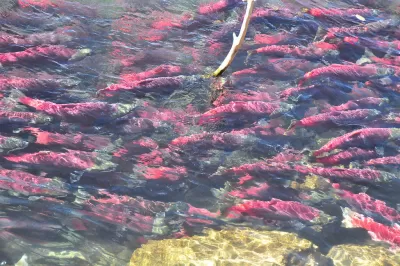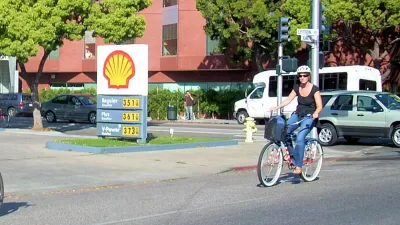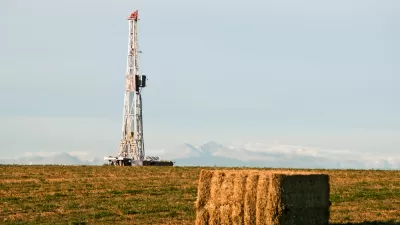A contentious initiative on the Alaska ballot next month pits protecting salmon habitat protections against the interests of the oil and gas industry and mining companies.

"The ballot measure pits the state's love for salmon against its need for oil and mining revenue," states the NPR Morning Edition host.
The controversial measure has drawn more money than all three gubernatorial candidates combined. It's also a hot-button topic in this gubernatorial race.
Elizabeth Harball, Alaska Public Media's energy desk reporter, talks to the proponents and opponents of Alaska Ballot Measure 1, Salmon Habitat Protections and Permits Initiative (2018) in the source article [audio-only as of Tuesday evening].
"The measure looks to establish new [anadromous] fish habitat guidelines for permitting large-scale projects like mining, or oil and gas," notes a KTVA broadcast of an Oct. 4 debate hosted by Alaska Common Ground exploring the pros and cons of the salmon habitat ballot initiative. The measure was placed on the ballot by a petition drive sponsored by a coalition, Save the Salmon, which includes The Alaska Center and Cook Inletkeeper, affiliated with Waterkeeper Alliance.
According to the proponents, "salmon populations across Alaska have been declining in recent years, and our 60-year-old laws, intended to protect Alaska salmon habitat for future generations, have become outdated and ineffective."
Parts of the initiative was successfully contested by the state attorney general's office, but the remainder could go forward, reported Harball.
Lawyers for the state, who challenged the initiative in court, are also counting the outcome as a win. That's because they weren't arguing whether Yes for Salmon is good policy or not — they just said it violated a specific part of the Alaska constitution. Now that the Supreme Court took out the unconstitutional provisions, the state's narrow legal challenge ends.
Opposing the measure is Stand for Alaska, "backed by the state's biggest oil, gas and mining companies, like BP, ConocoPhillips, the Pebble Limited Partnership and Donlin Gold, as well as Alaska Native corporations, trade unions and other groups," wrote Harball. According to the group, the measure "poses a threat to Alaska's communities, our jobs and our economy by adding complicated red tape that will impact private property owners and companies alike."
The measure is classified as an indirect initiated state statute, meaning that it qualified by petition gathering and was sent to the legislature which could have adopted it outright, amended and then approved it, or placed a competing measure on the ballot. "Nine states out of the 21 with initiated state statutes allow for this process," according to Ballotpedia.
FULL STORY: Energy Companies In Alaska Fight Controversial Salmon Initiative

Trump Administration Could Effectively End Housing Voucher Program
Federal officials are eyeing major cuts to the Section 8 program that helps millions of low-income households pay rent.

Planetizen Federal Action Tracker
A weekly monitor of how Trump’s orders and actions are impacting planners and planning in America.

Ken Jennings Launches Transit Web Series
The Jeopardy champ wants you to ride public transit.

California Invests Additional $5M in Electric School Buses
The state wants to electrify all of its school bus fleets by 2035.

Austin Launches $2M Homelessness Prevention Fund
A new grant program from the city’s Homeless Strategy Office will fund rental assistance and supportive services.

Alabama School Forestry Initiative Brings Trees to Schoolyards
Trees can improve physical and mental health for students and commnity members.
Urban Design for Planners 1: Software Tools
This six-course series explores essential urban design concepts using open source software and equips planners with the tools they need to participate fully in the urban design process.
Planning for Universal Design
Learn the tools for implementing Universal Design in planning regulations.
Ada County Highway District
Clanton & Associates, Inc.
Jessamine County Fiscal Court
Institute for Housing and Urban Development Studies (IHS)
City of Grandview
Harvard GSD Executive Education
Toledo-Lucas County Plan Commissions
Salt Lake City
NYU Wagner Graduate School of Public Service





























